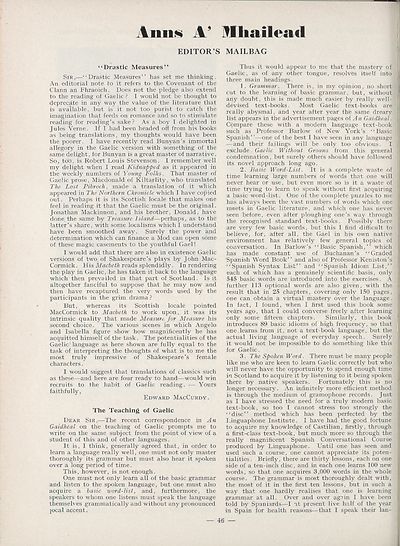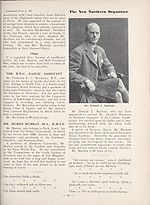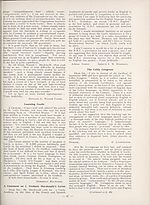An Comunn Gàidhealach Publications > Gaidheal > Volume 49--51, January 1954--December 1956
(100) Page 46
Download files
Complete book:
Individual page:
Thumbnail gallery: Grid view | List view

Anns A’ Mhailcnd
EDITORS
“Drastic Measures’’
Sir,—“Drastic Measures’’ has set me thinking.
An editorial note to it refers to the Covenant of the
Clann an Fhraoich. Does not the pledge also extend
to the reading of Gaelic ? I would not be thought to
deprecate in any way the value of the literature that
is available, but is it not too purist to catclr the
imagination that feeds on romance and so to stimulate
reading for reading’s sake? As a boy I delighted in
Jules Verne. If I had been headed off from his books
as being translations, my thoughts would have been
the poorer. I have recently read Bunyan’s immortal
allegory in the Gaelic version with something of the
same delight, for Bunyan is a great master of narrative.
So, tob, is Robert Louis Stevenson. I remember well
my delight when I read Kidnapped as it appeared in
the weekly numbers of Young Folks. That master of
Gaelic prose, Macdonald of Kiltarlity, who translated
The Lost Pibroch, made a translation of it which
appeared in The Northern Chronicle which I have copied
out. Perhaps it is its Scottish locale that makes one
feel in reading it that the Gaelic must be the original.
Jonathan Mackinnon, and his brother, Donald, have
done the same by Treasure Island—perhaps, as to the
latter’s share, with some localisms which I understand
have been smoothed away. Surely the power and
determination which can finance a Mod can open some
of these magic casements to the youthful Gael!
I would add that there are also in existence Gaelic
versions of two of Shakespeare’s plays by John Mac-
Cormick. His Macbeth reads splendidly. In rendering
the play in Gaelic, he has taken it back to the language
which then prevailed in that part of Scotland. Is it
altogether fanciful to suppose that he may now and
then have recaptured the very words used by the
participants in the grim drama?
But, whereas its Scottish locale pointed
MacCormick to Macbeth to work upon, it was its
intrinsic quality that made Measure for Measure his
second choice. The various scenes in which Angelo
and Isabella figure show how magnificently he has
acquitted himself of the task. The potentialities of the
Gaelic1 language as here shown are fully equal to the
task of interpreting the thoughts of what is to me the
most truly impressive of Shakespeare’s female
characters.
I would suggest that translations of classics such
as these—and here are four ready to hand—would win
recruits to the habit of Gaelic reading. — Yours
faithfully,
Edward MacCurdy.
The Teaching of Gaelic
Dear Sir,—The recent correspondence in An
Gaidheal on the teaching of Gaelic prompts me to
write on the same subject from the point of view of a
student of this and of other languages.
It is, I think, generally agreed that, in order to
learn a language really well, one must not only master
thoroughly its grammar but must also hear it spoken
over a long period of time.
This, however, is not enough.
One must not only learn all of the basic grammar
and listen to the spoken language, but one must also
acquire a basic word-list, and, furthermore, the
speakers to whom one listens must speak the language
themselves grammatically and without any pronounced
local accent.
MAILBAG
Thus it would appear to me that the mastery of
Gaelic, as of any other tongue, resolves itself into
three main headings.
1. Grammar. There is, in my opinion, no short!
cut to the learning of basic grammar, but, without
any doubt, this is made much easier by really well-
devised text-books. Most Gaelic text-books are
really abysmal, and year after year the same dreary
list appears in the advertisement pages of An Gaidheal.
Compare these with a modern language text-book
such as Professor Barlow of New York’s “Basic
Spanish”—one of the best I have seen in any language
—and their failings will be only too obvious. I
exclude. Gaelic Without Groans from this general
condemnation, but surely others should have followed
its novel approach long ago.
2. Basic Word-List. It is a complete waste of
time learning large numbers of words that one will
never hear or use, but even more so is it a waste of
time trying to learn to speak without first acquiring
a basic word-list. One of the complete puzzles to me
has always been the vast numbers of words which one
meets in Gaelic literature, and which one has never
seen before, even after ploughing one’s way through
the recognised standard text-books. Possibly there
are very few basic words, but this I find difficult to
believe, for, after all, the Gael in his own native
environment has relatively few general topics of
conversation. In Barlow’s “Basic Spanish,” which
has made constant use of Buchanan’s “Graded
Spanish Word Book” and also of Professor Keniston’s
“Spanish Syntax List” and “Spanish Idiom List,”
each of which has a genuinely scientific basis, only
545 basic words are introduced into the exercises. A
further 113 optional words are also given, with the
result that in 25 chapters, covering only 150 pages,
one can obtain a virtual mastery over the language.
In fact, I found, when I first used this book some
years ago, that I could converse freely after learning
only some fifteen chapters. Similarly, this book
introduces 89 basic idioms of high frequency, so that
one learns from it, not a text-book language, but the
actual living language of everyday speech. Surely
it would not be impossible to do something like this
for Gaelic.
3. The Spoken Word. There must be many people
like me who are keen to learn Gaelic correctly but who
will never have the opportunity to spend enough time
in Scotland to acquire it by listening to it being spoken
there by native speakers. Fortunately this is no
longer necessary. An infinitely more efficient method
is through the medium of gramophone records. Just
as I have stressed the need for a truly modern basic
text-book, so too I cannot stress too strongly the
“disc” method which has been perfected by the
Linguaphone Institute. I have had the good fortune
to acquire my knowledge of Castilian, firstly, through
a first-class text-book, but much more so through the
really magnificent Spanish Conversational Course
produced by Linguaphone. Until one has seen and
used such a course, one cannot appreciate its poten¬
tialities . Briefly, there are thirty lessons, each on one
side of a ten-inch disc, and in each one learns 100 new
words, so that one acquires 3,000 words in the whole
course. The grammar is most thoroughly dealt with,
the most of it in the first ten lessons, but in such a
way that one hardly realises that one is learning
grammar at all. Over and over again I have been
told by Spaniards—I at present live half of the year
in Spain for health reasons—that I speak their lan-
EDITORS
“Drastic Measures’’
Sir,—“Drastic Measures’’ has set me thinking.
An editorial note to it refers to the Covenant of the
Clann an Fhraoich. Does not the pledge also extend
to the reading of Gaelic ? I would not be thought to
deprecate in any way the value of the literature that
is available, but is it not too purist to catclr the
imagination that feeds on romance and so to stimulate
reading for reading’s sake? As a boy I delighted in
Jules Verne. If I had been headed off from his books
as being translations, my thoughts would have been
the poorer. I have recently read Bunyan’s immortal
allegory in the Gaelic version with something of the
same delight, for Bunyan is a great master of narrative.
So, tob, is Robert Louis Stevenson. I remember well
my delight when I read Kidnapped as it appeared in
the weekly numbers of Young Folks. That master of
Gaelic prose, Macdonald of Kiltarlity, who translated
The Lost Pibroch, made a translation of it which
appeared in The Northern Chronicle which I have copied
out. Perhaps it is its Scottish locale that makes one
feel in reading it that the Gaelic must be the original.
Jonathan Mackinnon, and his brother, Donald, have
done the same by Treasure Island—perhaps, as to the
latter’s share, with some localisms which I understand
have been smoothed away. Surely the power and
determination which can finance a Mod can open some
of these magic casements to the youthful Gael!
I would add that there are also in existence Gaelic
versions of two of Shakespeare’s plays by John Mac-
Cormick. His Macbeth reads splendidly. In rendering
the play in Gaelic, he has taken it back to the language
which then prevailed in that part of Scotland. Is it
altogether fanciful to suppose that he may now and
then have recaptured the very words used by the
participants in the grim drama?
But, whereas its Scottish locale pointed
MacCormick to Macbeth to work upon, it was its
intrinsic quality that made Measure for Measure his
second choice. The various scenes in which Angelo
and Isabella figure show how magnificently he has
acquitted himself of the task. The potentialities of the
Gaelic1 language as here shown are fully equal to the
task of interpreting the thoughts of what is to me the
most truly impressive of Shakespeare’s female
characters.
I would suggest that translations of classics such
as these—and here are four ready to hand—would win
recruits to the habit of Gaelic reading. — Yours
faithfully,
Edward MacCurdy.
The Teaching of Gaelic
Dear Sir,—The recent correspondence in An
Gaidheal on the teaching of Gaelic prompts me to
write on the same subject from the point of view of a
student of this and of other languages.
It is, I think, generally agreed that, in order to
learn a language really well, one must not only master
thoroughly its grammar but must also hear it spoken
over a long period of time.
This, however, is not enough.
One must not only learn all of the basic grammar
and listen to the spoken language, but one must also
acquire a basic word-list, and, furthermore, the
speakers to whom one listens must speak the language
themselves grammatically and without any pronounced
local accent.
MAILBAG
Thus it would appear to me that the mastery of
Gaelic, as of any other tongue, resolves itself into
three main headings.
1. Grammar. There is, in my opinion, no short!
cut to the learning of basic grammar, but, without
any doubt, this is made much easier by really well-
devised text-books. Most Gaelic text-books are
really abysmal, and year after year the same dreary
list appears in the advertisement pages of An Gaidheal.
Compare these with a modern language text-book
such as Professor Barlow of New York’s “Basic
Spanish”—one of the best I have seen in any language
—and their failings will be only too obvious. I
exclude. Gaelic Without Groans from this general
condemnation, but surely others should have followed
its novel approach long ago.
2. Basic Word-List. It is a complete waste of
time learning large numbers of words that one will
never hear or use, but even more so is it a waste of
time trying to learn to speak without first acquiring
a basic word-list. One of the complete puzzles to me
has always been the vast numbers of words which one
meets in Gaelic literature, and which one has never
seen before, even after ploughing one’s way through
the recognised standard text-books. Possibly there
are very few basic words, but this I find difficult to
believe, for, after all, the Gael in his own native
environment has relatively few general topics of
conversation. In Barlow’s “Basic Spanish,” which
has made constant use of Buchanan’s “Graded
Spanish Word Book” and also of Professor Keniston’s
“Spanish Syntax List” and “Spanish Idiom List,”
each of which has a genuinely scientific basis, only
545 basic words are introduced into the exercises. A
further 113 optional words are also given, with the
result that in 25 chapters, covering only 150 pages,
one can obtain a virtual mastery over the language.
In fact, I found, when I first used this book some
years ago, that I could converse freely after learning
only some fifteen chapters. Similarly, this book
introduces 89 basic idioms of high frequency, so that
one learns from it, not a text-book language, but the
actual living language of everyday speech. Surely
it would not be impossible to do something like this
for Gaelic.
3. The Spoken Word. There must be many people
like me who are keen to learn Gaelic correctly but who
will never have the opportunity to spend enough time
in Scotland to acquire it by listening to it being spoken
there by native speakers. Fortunately this is no
longer necessary. An infinitely more efficient method
is through the medium of gramophone records. Just
as I have stressed the need for a truly modern basic
text-book, so too I cannot stress too strongly the
“disc” method which has been perfected by the
Linguaphone Institute. I have had the good fortune
to acquire my knowledge of Castilian, firstly, through
a first-class text-book, but much more so through the
really magnificent Spanish Conversational Course
produced by Linguaphone. Until one has seen and
used such a course, one cannot appreciate its poten¬
tialities . Briefly, there are thirty lessons, each on one
side of a ten-inch disc, and in each one learns 100 new
words, so that one acquires 3,000 words in the whole
course. The grammar is most thoroughly dealt with,
the most of it in the first ten lessons, but in such a
way that one hardly realises that one is learning
grammar at all. Over and over again I have been
told by Spaniards—I at present live half of the year
in Spain for health reasons—that I speak their lan-
Set display mode to:
![]() Universal Viewer |
Universal Viewer | ![]() Mirador |
Large image | Transcription
Mirador |
Large image | Transcription
| An Comunn Gàidhealach > An Comunn Gàidhealach Publications > Gaidheal > Volume 49--51, January 1954--December 1956 > (100) Page 46 |
|---|
| Permanent URL | https://digital.nls.uk/127173621 |
|---|
| Description | This contains items published by An Comunn, which are not specifically Mòd-related. It includes journals, annual reports and corporate documents, policy statements, educational resources and published plays and literature. It is arranged alphabetically by title. |
|---|
| Description | A collection of over 400 items published by An Comunn Gàidhealach, the organisation which promotes Gaelic language and culture and organises the Royal National Mòd. Dating from 1891 up to the present day, the collection includes journals and newspapers, annual reports, educational materials, national Mòd programmes, published Mòd literature and music. |
|---|---|
| Additional NLS resources: |
|

